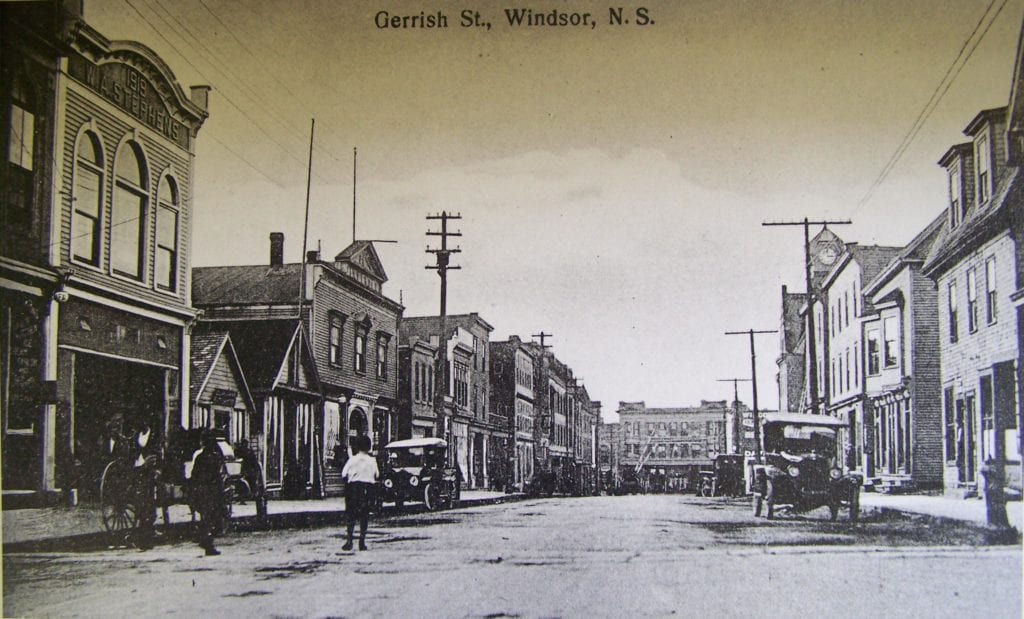THE (Berwick) REGISTER
February 13, 1918
The Rule of the Road.
(Letter from Judge Savary)
To the Editor of the SPECTATOR
SIR: – I notice by your last issue that a vigorous effort is being made to secure a change in the “rule of the
road” which in these Maritime Provinces requires two carriages passing each either travelling in opposite
directions to keep to their left. This is the rule in England and has been from time immemorial, and like
all the common law of England is founded on common sense. The object is of course more safety from
collision in the vast majority of cases. Passing to the left the two drivers are nearest each other and both
on the side of the vehicle which alone is in danger of collision with the other, and each can watch plainly
his own wheels and those of his neighbor, ready to give a quick turn to his horse at the moment when a
collision by some sudden mishap becomes imminent. Sound policy based on the most obvious
considerations of safety is decidedly in favor of the present rule. It would be years before our people
would get accustomed to the new one, and incautiously many would forget it, old habit would
unconsciously rule and many serious accidents would occur. It would take a generation to get habituated
to the new rule so that our roads would be as safe under it as they are now; a man in an ordinary carriage
meeting an automobile coming swiftly would not have time to check his natural impulse to steer to the
left before the disaster would be on him. I do not see how it can be safer or more convenient for
automobiles to pass to the right in meeting. Perhaps our fellow citizen who is pressing this matter has had
an experience in driving automobiles that I have not had and may see it all very plainly; but surely those
who drive carriages are yet in a large majority over those who can afford autos and legislation should be
framed with a view to the convenience of the many and not of the few. The slow teams of the farmers are
sufficiently discommoded now by the privileges accorded to motorists who too often abuse their
privileges by excessive speeding, killing dogs and fowls. There are parts of the country now where the
unpopularity of automobiles is evinced by unlawful acts, and it would be unwise to increase this dislike
by compelling people to change the rule of the road to which our people are trained from childhood, and
which is recognized as best and safest for the ordinary traffic of the country. The English rule which we
have was brought into the old colonies by the first settlers and continued to the time of the Revolution,
when I have heard it said it was abandoned out of pure opposition to everything English. Perhaps
however, the greater prevalence of ox teams in the new settlements had something to do with it. Along the
long frontier between the United States and old Canada frequent crossing and re- crossing compelled the
fewer Canadians to conform by degrees more and more to the custom of their neighbors. But the Loyalists
brought the English rule to the Maritimes Provinces, where I hope it will remain.
I cannot regard as serious the argument that we should change our law to accommodate American visitors
who come here every summer with their motors. That would be carrying international courtesy to a
humiliating extreme. It would be worse than making the majority yield to the convenience of the larger
majority of our own people. The American Visitors inform themselves of our rule and obey it.
A. W. SAVARY.
Annapolis Royal Jan 23.
About the author:
John D. Wilson is a lifelong resident of Nova Scotia. Born in Windsor Forks in 1939, he followed a career in the computer field. In 1975 John joined the Engineering Technology Department of the Nova Scotia Institute of Technology where he taught Electronic and Computer Technology. He led in the establishment of a number of training programs including the Automated Manufacturing Technology Program. John later joined the Adult Training Division of the Department of Education from which he retired in 1997.
John and his life partner, Laura (Baxter), live in Wentworth Creek where they raised two daughters who have given them the precious gift of three grandchildren.
History and genealogy have been John/s passion from childhood, West Hants Historical Society offered him a wealth of information on the community and its people. Here he studied records, assisted visitors from all over the world and developed deep friendship with fellow volunteers. He has served in many capacities with WHHS from volunteer, to researcher to President. John has researched a great deal of the history of Hants County and has written a number of related articles that he wishes to share on this Website.

